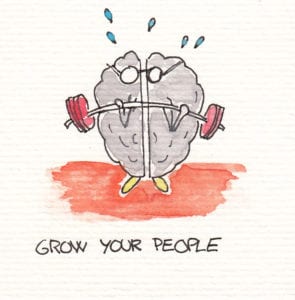Cultivate a Growth Mindset
Mindset is everything. If we think we can’t do something, then we will never do it. If we think we can, then we will find a way. The idea set out in the book The Growth Mindset by Carol S. Dweck Ph.D., is that people have two different mindsets: Fixed and Growth.
A Fixed Mindset person believes that the amount of intelligence, strength, athleticism etc a person possesses is fixed and can not be improved. When a Fixed Mindset person is challenged by a tough problem she can’t figure out, she feels defeated, quits, and avoids those problems in the future.
The Growth Mindset is quite the opposite. It’s the belief that anyone can change anything about themselves at any time. Her identity has nothing to do with being the smartest kid or best athlete. She focuses only on improving her knowledge and athleticism. She isn’t afraid of mistakes like the Fixed Mindset person because she understands that mistakes will help her learn and improve.

The Mindsets in Action
A Fixed Mindset person that isn’t confident in math may forever avoid doing it in order to not feel stupid in front of others. She doesn’t want others to judge her. She also believes that she simply isn’t good at math and therefore never challenges that belief. On the other hand, A Growth Mindset person will study hard and work at the math until she feels confident and becomes exceptionally good at it because she believes the outcome is based on her effort not her innate intelligence.
Wouldn’t we all do better at life if we remembered that effort and learning are the real keys to accomplishing anything. But how do we train ourselves and our children to lean into the Growth Mindset?
Failing OftenA fantastic example of this is something I read a long time ago. A successful female entrepreneur attributed her success to the fact that her dad asked her every day after school if she failed at anything that day. If she did, he gave her a high five! A high five! Isn’t that an incredible way to teach kids (and even adults!) that it’s ok to do hard things and fail! She learned early on that failing is an important step in life and she can use it to grow and increase her efforts.
Related Post: Easy Ways to Improve Your Quality of Life
Further Resources and Activities:
- 75 Inspiring Quotes for Growth Mindset
- Amazing Books That Teach Growth Mindset
- 17 Fun Activities to Build a Growth Mindset
After some research and experimenting, these are the different books and activities that I incorporate into my own home in the hopes that my kids (and my husband and I) develop that critical Growth Mindset. I hope to continue to find ideas and activities to help us remember we can learn from anything. Please share if you have any! We are always looking to improve!
Would you like to save this idea?
The Fixed Mindset by Carol S. Dweck Ph.D.
Raising Happiness by Christine Carter, Ph.D.
Your Fantastic Elastic Brain: Stretch It Shape It by JoAnn Deak, PhD
The Girl Who Never Made Mistakes by Mark Pett and Gary Rubinstein
Papa’s Mechanical Fish by Candace Fleming
The Growth Mindset cards from BigLifeJournal.com – we love asking these questions during dinner!
*Asking the kids (or yourself) “Did you do anything hard today?” “Did you make mistakes?” and acting disappointed if not. Then sharing our own hard things and how they were based on effort and not some born talent. Again, dinnertime is a great time to share these things!
*Working to praise others on their efforts. Instead of saying “you are so smart!, ” according to Dweck, it’s better to say “I can tell you worked really hard on that project.”




I love this idea. Sometimes we try to ‘protect’ our children from hard things, or even from failure, when in fact that it doing them a disservice. Great topic and ideas.